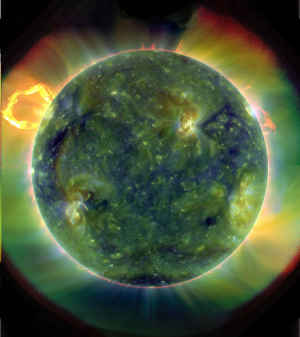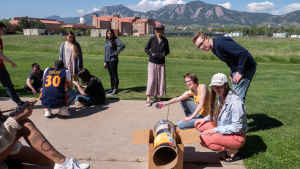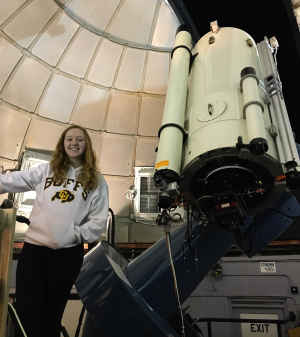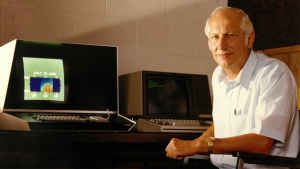
We’re in this together
Teaching tomorrow’s scientists and researchers to ask the big questions
Audio plays during this story.

A fiery love affair
Every long-distance relationship, especially one that stretches across 93 million miles, has its difficult moments.

Take the celestial courtship between the sun and the Earth.
Sure, the sun warms the Earth, stirs our atmosphere, influences our weather, propels our orbit and gives us humans life. But the sun—its vibrations heard here in sound captured by NASA—can also be an unpredictable tempest, an insanely hot dynamo that pumps out 4 million tons of matter into energy every second.

Energy from a monster solar storm, for example, hit Earth in 1859, causing widespread powerful auroras in the sky and havoc on the ground with telegraph systems, the modern telecommunications of the time.
While the intensity and frequency of solar flares vary, a storm of this magnitude today would cause widespread disruption to electrical grids, global positioning systems, air travel and even the internal compasses of racing pigeons and wedding doves.

Understanding the impact of solar events on us Earthlings is important for scientific, social and economic reasons.
Scientists know solar events like this can happen but don’t always know why or when.

“I think we study the sun—as humans, as scientists—for the same reason we study anything, and it's that we don't know everything about it yet. It's human nature to want to know, and so, that's why we do it.”
Willow Reed, CU alumna
Willow Reed, a 2017 graduate of CU Boulder, is part of the next generation of scientists who learn alongside talented CU researchers supported by generous donors.
Her research of solar flares builds from a childhood passion for space science, one that was launched because of CU Boulder’s location amid one of the greatest concentrations of solar physics institutes in the world.
It’s this collaboration that allows places like CU to nurture passion and curiosity across disciplines and perspectives, encouraging bright minds to ask big questions:
How do we cure cancer?
Will artificial intelligence change us?
What’s beyond our solar system?

“Science is important because we as humans can't help but ask the question why or what, and we want to know more, and if we don't know all the answers, we're going to keep searching for them. But you have to have public support, so getting people involved in science is what's shaping our next steps as society and as humanity."

"Not even looking at astronomy or astrophysics, look at general science. If you don't have public support, you don't have funding. Then how else are you supposed to discover the Titanic, or shoot things into space, or counteract climate change? It's a big deal.”

A match made in Boulder
Last summer, Reed served as program director of the Research Experience for Undergraduates (REU) for the Laboratory for Atmospheric and Space Physics (LASP), the same one she participated as an undergraduate student at CU Boulder.

Funded by the National Science Foundation, REUs support hands-on research opportunities for undergraduate students and are offered at academic institutions across the country.

Twenty-seven undergraduates from around the country attended the REU led by Reed. Opportunities like this are possible because of the incredible partnerships CU forms with scientific laboratories and research institutions here in Colorado and around the world.

They learned technical skills like software programming and building sensors.

They learned how to conduct proper academic research.

They discovered what they want to research.

And they met other researchers and scientists.
Hazel Bain was an REU mentor this year. A research scientist with the Cooperative Institute for Research in Environmental Sciences at CU Boulder and a contract employee with the National Oceanic and Atmospheric Administration, Bain has mentored students through other programs, including an REU at UC Berkeley.
As an undergraduate student, Bain was mentored.

“The times that I’ve thrived in my career is when I’ve had a mentor that advised me and supported me and cheered me on. You can learn the physics from a book, but you can’t learn the job from a book, so it’s a good way to figure out how to navigate this career.”
Hazel Bain
Thania Ruiz, an aerospace engineering student at CU Boulder, said the research experience gave her the confidence to claim her spot in the scientific field.

“Sometimes in my major, there's a bunch of guys all the time and there's hardly any girls...That's when I meet people that are also different, they're going through the same experiences as I am, it helps them feel like, 'Oh, you know what? Maybe I am in the right track. Maybe I am where I'm supposed to be.'"
Thania Ruiz, CU student

The thrill of discovery
Reed knows that feeling. As a freshman, she wanted to do research but hadn’t chosen a field yet, so her advisor invited her to tag along in the REU. Most REU students were upperclassmen. She was the youngest in the room.

“Being a scientist is a huge part of my identity, but I'm not sure if it always was. On some level I think it was; I was always very curious as a child. I loved the science fair and doing that with my dad, but I also was a huge dancer and performer. That was also a large part of my identity back then; I would say it was bigger than being a scientist. Partly just because I didn't know what being a scientist was yet.”
Willow Reed

In her junior year, Reed received the Charles A. Barth Scholarship in Space Research.

Barth was a leader at LASP for nearly four decades and left a legacy of inspiring space science students.

Initially called the Upper Air Laboratory, LASP was created in 1948 by CU Boulder physicists (a decade before NASA was founded) to study Earth's atmosphere and develop instruments launched aboard rockets.

The endowed scholarship was more than just financial relief for Reed. It was a chance to share her research with others in her field. She’s been investigating the sun ever since.

And she wants to share her work beyond the science community. Reed, who started her PhD at Montana State University this fall, has a personal mission to help the public gain a deeper understanding of science and all its applications.
As part of her career, Reed is hoping to expand science education and outreach in our communities.

After all, as human beings, we love those “Eureka!” moments.

“You really need to get people excited, and not just on an elementary and middle school level, but on an adult level. If you can get adults excited, then they'll help support it. They'll help elect people that will fund it.”

“They will make sure that science moves forward so that everybody on the planet can learn and discover. That's why public outreach is important because we need people to appreciate science and want to fund it in order to continue doing it and discovering and solving these mysteries.”


